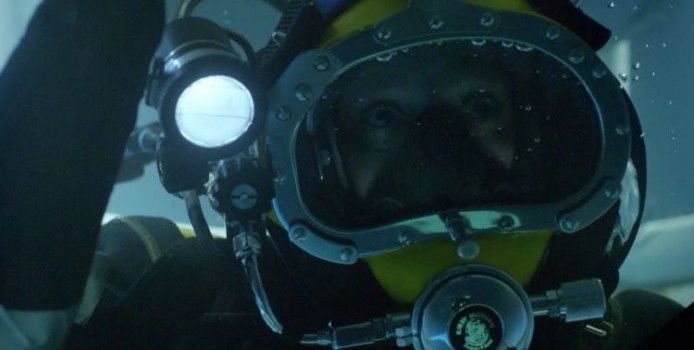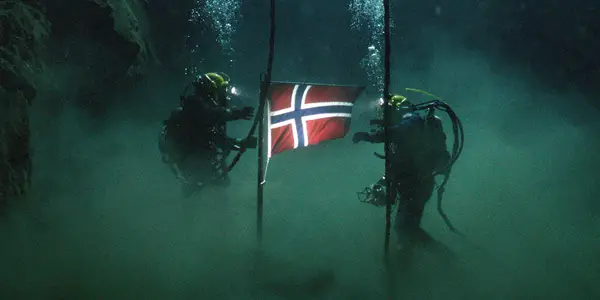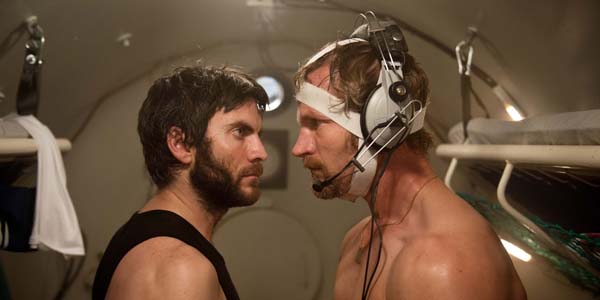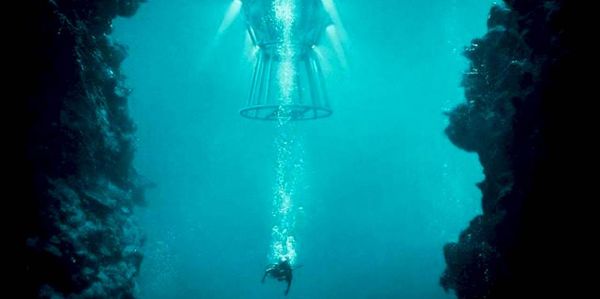PIONEER: 20,000 Lies Under The Sea

Ben's milkshake is unisex and brings everyone to the yard.…
According to my personal checklist, the extent to which a film can affect a viewer is a mark of its quality. Pioneer must have done something right, because it absolutely wrecked my sense of calm. A full 24 hours after watching director Erik Skjoldbjærg’s thriller for the first time, I still find myself feeling strangely uneasy – stealing glances over my shoulder, eyeing my friends and family with icy distrust…I even threw out a plate of unattended food on the off chance it had been poisoned by the shady agents of a deep-sea drilling conglomerate.
If psychological impact was the only criterion, Pioneer would be a masterpiece – unfortunately, other elements of the film aren’t of the same caliber. A great cast and an interesting premise aren’t enough to mask Pioneer’s messy plot and bothersome tonal inconsistencies.
A Unique Setting
Pioneer is set in 1970s Norway at the height of the Norwegian Oil Boom. Commercial divers Petter (Aksel Henning) and Knut (Andre Erisken) are preparing to – wait a second.
Time out.
What was that? You mean to tell me you’ve never heard of the Norwegian Oil Boom? That’s ok. To be honest, neither had I.

Here’s the gist: huge oil reserves have been discovered in the North Sea, and nations and corporations are scrabbling to lay claim to the black gold. Before they can get their grubby paws on the crude, the oil companies need to overcome the challenge of depth: in order to lay the requisite pipeline, divers need to find a way to function at staggering depths of up to 500 meters below the ocean’s surface.
Time in.
Back to Petter and Knut – they’re commercial offshore divers, part of a joint Norwegian-American venture aiming to make this seemingly impossible task possible. The project is part exploration, part corporate arms race; scientific endeavor with a massive financial incentive. As a backdrop for a film, it’s as unique and fascinating as they come.
Under Pressure
It’s been said that we know more about the surface of the moon than the bottom of the ocean, so I guess it makes sense that at first, Pioneer feels an awful lot like a space exploration film. The divers are treated much like astronauts, and much of the film’s opening deals with their training as they try to prepare their bodies and minds for the rigors of the dive. However, it quickly becomes apparent that Pioneer is something else entirely.
During an early deep-sea ‘verification test,’ Petter’s momentary lapse of concentration causes an explosion which kills a fellow diver. In the aftermath of the fatal incident, Pioneer quickly descends into the murky depths of conspiracy.
After the test dive is aborted, Petter and the remaining divers are subject to a two-week de-pressurization process before they can return to the surface. Isolated with his thoughts and the corpse of his fallen colleague, Petter begins to wonder what exactly went wrong. Was the accident a result of his negligence, or something more sinister? Is Petter merely trying to assuage his guilt, or are his suspicions of foul play justified? Petter’s paranoia only increases when his attempts to investigate are dismissed or stonewalled by the other members of his team.
What happens next is a sordid tale of lies, cover-ups, betrayals, tainted gas samples, limping hitmen and exploding speedboats. Does that sound ridiculous? Because a lot of it is. Pioneer’s transition from ‘based on true events’ to ‘based on absolute nonsense’ is swift and baffling. To be fair, there are some brilliant sequences, such as a frantic race against ‘the bends’ when Petter is de-pressurized too quickly, but things too often get silly. I need to make special mention of Wes Bentley’s character Mike, an American diver who’s so surly and despicable that he stops just short of wearing a cape and twirling a mustache. The unease that Pioneer creates stems from helplessness in the face of corporate manipulation and deceit, not shadowy assassins and unexplained explosions. These far-fetched elements are as unnecessary as they are poorly executed.

It’s to Aksel Hennie’s great credit that the film maintains any sort of believability. His performance as Petter is outstanding. As the proceedings around him become increasingly far-fetched, Petter manages to keep things from spinning out of control. Even as he begins to doubt his own mind, he continues his search for the truth, and it’s fascinating to watch.
Nuts and Bolts
In terms of overall production, Pioneer is impressive. Skjoldbjærg and writer Nikolaj Frobenius worked together on 1997’s Insomnia, which inspired Christopher Nolan’s thriller of the same title, and they seem very comfortable in collaboration. The script deftly alternates between Norwegian and English, and they manage to capture some of the psychological depth that made Insomnia so successful.
With a budget of around 6 million euros (remarkably small for a film of this type) Skjoldbjærg’s film definitely punches above its weight.
The underwater sequences are particularly impressive, haunting and beautifully shot. By keeping the camera close to the action, cinematographer Jallo Faber reinforces the thematic (and literal) claustrophobia and mitigates the constraints of Pioneer’s relatively modest budget – the filmmakers provide enough context for the action to make sense without having to rely on CGI or large-scale practical effects. Furthermore, the technical nous on display in Pioneer is commendable; the film’s missteps are primarily creative ones.
That Sinking Feeling
Petter’s feverish search for the truth is reminiscent of classic paranoia films like Francis Ford Coppola’s The Conversation, but the execution leaves much to be desired. There’s plenty of tension, but no pace. After a strong opening, Pioneer just kind of…meanders. There’s a constant feeling of dread, and Petter’s paranoia is infectious, but a lack of progression to the revelations makes the film’s resolution feel like yet another twist rather than a culmination.

I was also bothered by the lack of connection between Petter and the surrounding characters. His isolation is important to the central idea of the film, but it also lowers the emotional stakes, especially when it comes to characters who are (supposedly) on Petter’s side. It’s hard for the filmmakers to conjure a feeling of betrayal when they’ve committed so little time to establishing trust. There’s a fine line between understatement and a complete lack of emotional groundwork, and Pioneer steps over it more than I’d like.
Pioneer also suffers from an over-abundance of ambition. It can’t decide whether it wants to be a paranoid mood poem, classic conspiracy film, or heavy-handed corporate critique, and ends up being a muddled mixture of all three. The unique backdrop of the Norwegian Oil Boom ends up falling by the wayside as the body count rises, and I found myself hungry for more information about the real story. It makes me wonder if Pioneer, which is ostensibly “based on true events,” might have been more effective as a documentary.
There’s a lot to like about Skjoldbjærg’s thoroughly original thriller. It’s technically impressive and psychologically troubling, but Pioneer ultimately implodes under the pressure of its own lofty ambitions.
Will you be seeing Pioneer? What are some of your favorite Scandinavian films? We’d love to hear from you.
Does content like this matter to you?
Become a Member and support film journalism. Unlock access to all of Film Inquiry`s great articles. Join a community of like-minded readers who are passionate about cinema - get access to our private members Network, give back to independent filmmakers, and more.
Ben's milkshake is unisex and brings everyone to the yard. He'd love to give you more information about it but doesn't work pro bono.













